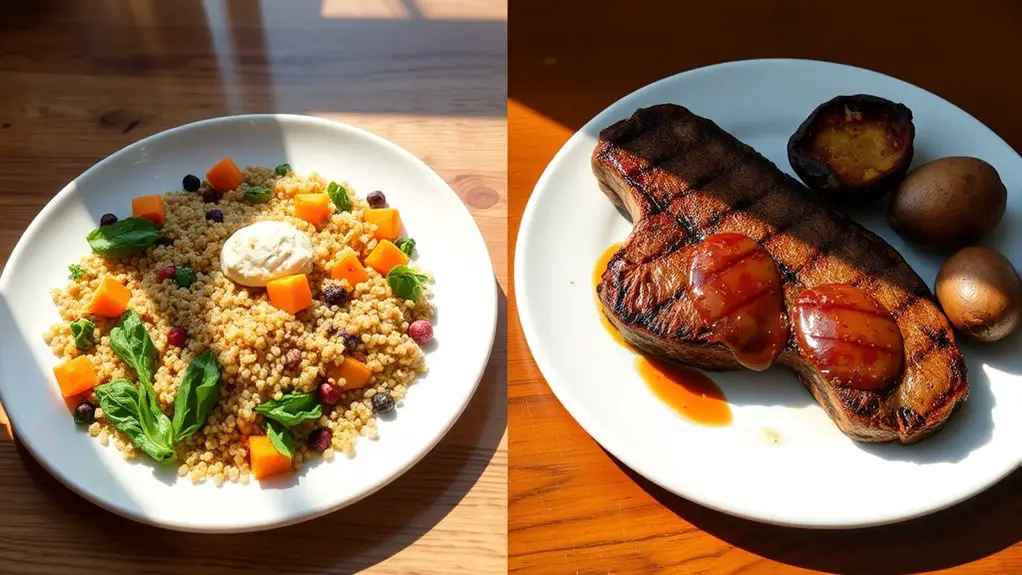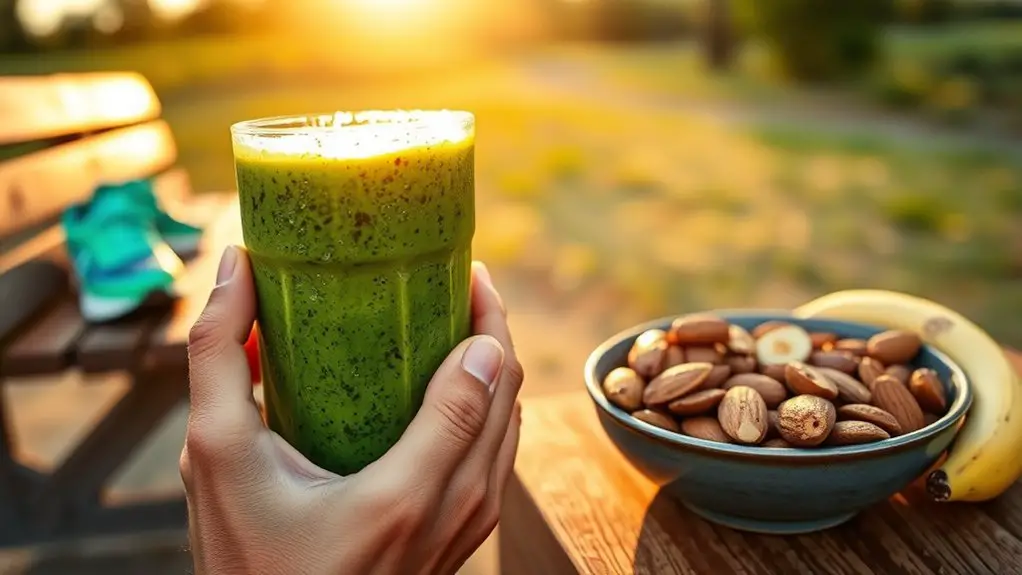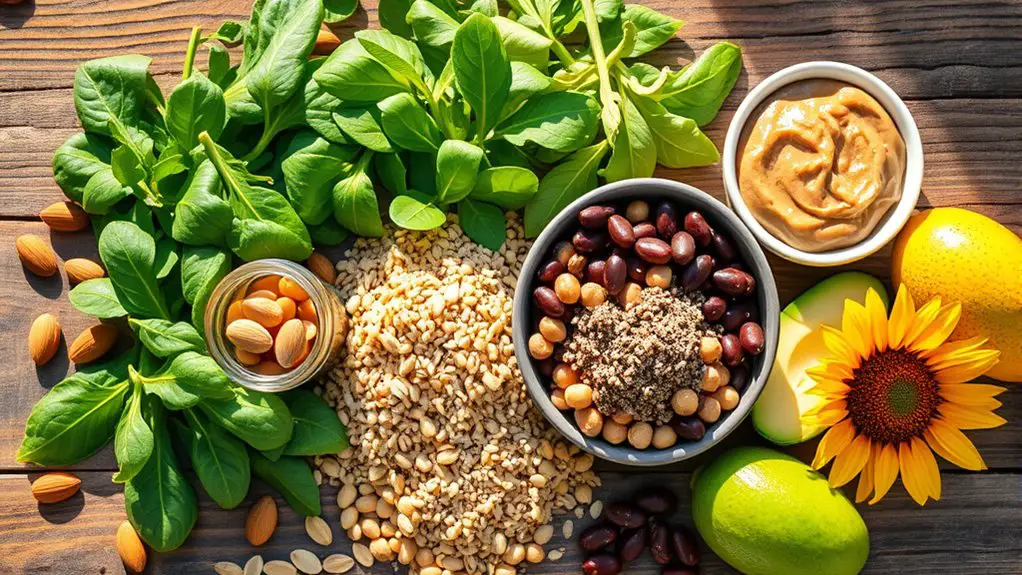To fuel endurance sports, focus on complex carbohydrates for sustained energy and include lean proteins for recovery. Power athletes, on the other hand, should prioritize protein for muscle growth and quick-digesting carbs for immediate energy. Healthy fats are beneficial for both groups. Timing your meals, hydrating well, and using appropriate supplements can enhance your performance. Let's explore how these strategies can optimize your training and tailor your nutrition to your specific athletic needs.
Understanding Energy Demands in Sports
When it comes to sports, understanding energy demands is essential, especially if you're looking to optimize your performance. Different sports require varying energy outputs, and knowing what your body needs can make all the difference. For endurance sports, like running or cycling, your energy primarily comes from aerobic metabolism, relying on fat and carbohydrates over longer periods. This means you'll need to focus on sustaining energy levels over time.
On the other hand, power sports, such as sprinting or weightlifting, demand quick bursts of energy, primarily fueled by anaerobic metabolism. Here, your body taps into stored carbohydrates for fast energy release.
Recognizing these differences empowers you to tailor your training and preparation. You'll have the freedom to explore what works best for you, whether it's pacing yourself for a marathon or pushing your limits in a high-intensity workout. Additionally, proper hydration plays a critical role in supporting your energy levels and overall performance. Understanding your sport's energy demands is your first step towards peak performance.
Nutritional Needs of Endurance Athletes
To excel in endurance sports, you need to pay close attention to your nutritional needs. Fueling your body correctly can make all the difference in achieving your goals and enjoying the journey. Start by focusing on your overall caloric intake; you'll need more energy to sustain those long workouts. Incorporate a variety of whole foods, like lean proteins, healthy fats, and plenty of fruits and veggies, to keep your body balanced and thriving.
Hydration's essential, too—don't underestimate its impact on your performance. Listen to your body; it knows what it needs. Eating smaller, frequent meals can help maintain energy levels throughout the day, allowing you to train harder and recover faster. Ultimately, embracing a flexible approach to your nutrition will empower you to explore your limits while enjoying the freedom of movement in endurance sports. Proper hydration is critical for endurance performance, so prioritize your nutritional needs, and watch your performance soar.
The Role of Carbohydrates in Endurance Nutrition
Carbohydrates play an essential role in fueling endurance athletes, as they provide the primary source of energy needed for long-duration activities. When you engage in extended exercise, your body relies on glycogen stores derived from carbs. To keep going strong, you'll want to prioritize complex carbohydrates like whole grains, fruits, and vegetables. These not only give you lasting energy but also help maintain stable blood sugar levels.
During your training, it's vital to consume enough carbs to replenish glycogen stores post-workout. Don't shy away from quick-digesting carbs, like bananas or energy gels, during long sessions; they'll give you that necessary boost. Remember, the right balance of carbohydrates can enhance your performance, allowing you to enjoy the freedom of movement and the thrill of pushing your limits. Additionally, understanding glycogen storage is crucial for optimizing your endurance performance. So, embrace carbs as your ally in endurance sports and fuel your journey toward achieving your personal best!
Protein Requirements for Power Athletes
When it comes to power athletes, protein plays an essential role in performance and recovery. You need to contemplate not just where your protein comes from, but also when you're consuming it throughout the day. Understanding daily protein recommendations can help you optimize your training and achieve your goals. Adequate protein intake reduces soreness and accelerates recovery time, ensuring you can maintain peak performance in subsequent workouts.
Protein Sources for Power
Power athletes rely heavily on adequate protein intake to fuel their training and enhance performance. To build muscle and recover effectively, it's essential to include high-quality protein sources in your diet. Lean meats like chicken, turkey, and beef are excellent choices, packed with essential amino acids. Fish, especially fatty types like salmon, not only provide protein but also healthy fats that support overall health. If you prefer plant-based options, consider lentils, chickpeas, or quinoa, which offer good protein content. Dairy products like Greek yogurt and cottage cheese also deliver protein while providing calcium. Don't forget eggs; they're versatile and rich in nutrients. By incorporating a variety of these sources, you can meet your protein needs and support your athletic goals.
Timing of Protein Intake
While the type of protein you consume is essential for power athletes, the timing of that intake can considerably impact muscle recovery and growth. It's vital to consume protein soon after your workout—ideally within 30 to 60 minutes. This window allows your muscles to absorb the amino acids they need for repair and growth. Don't just stop there; consider spreading your protein intake throughout the day in smaller, balanced doses. This approach helps maintain a steady supply of amino acids, supporting your performance and recovery. Remember, it's not just about quantity but when you fuel your body. Embrace this freedom to optimize your training, and you'll notice improvements in strength and overall athletic performance.
Daily Protein Recommendations
For power athletes, daily protein intake is essential for maximizing performance and muscle recovery. Generally, you should aim for 1.2 to 2.0 grams of protein per kilogram of body weight, depending on your training intensity and goals. If you're lifting heavy or training intensely, leaning toward the higher end can help support muscle repair and growth. It's not just about quantity; quality matters too. Choose sources like lean meats, dairy, eggs, and plant-based proteins to fuel your body effectively. Spreading your intake throughout the day, especially around workouts, can optimize benefits. Remember, your body thrives on the right nutrition, so don't underestimate the power of protein in your journey to strength and performance. Enjoy the freedom that comes with fueling your passion!
Fats: A Common Fuel Source for Both Types
Although athletes in endurance and power sports have different energy demands, fats serve as an essential fuel source for both. Fats provide a concentrated energy source that your body can tap into for long workouts or intense lifts. They're vital for sustaining energy levels and enhancing performance.
Here's a quick overview of how fats function for both types of athletes:
| Type of Sport | Role of Fats |
|---|---|
| Endurance Sports | Provide long-lasting energy |
| Power Sports | Support high-intensity efforts |
Incorporating healthy fats like avocados, nuts, and olive oil into your diet can help fuel your workouts effectively. Healthy fats are crucial for overall athletic health, supporting both training and recovery. It's all about balance, so don't shy away from fats; embrace them! They'll give you that freedom to push harder and go longer, whether you're running a marathon or crushing weights.
Meal Timing and Frequency for Optimal Performance
When it comes to meal timing, what you eat before and after your workout can make a big difference in your performance. You'll want to focus on a solid pre-workout nutrition strategy to fuel your body, while also being mindful of post-exercise recovery timing to help with muscle repair. Understanding these aspects can optimize your endurance or power training. Additionally, incorporating proper hydration into your routine is essential for maximizing workout efficiency and overall performance.
Pre-Workout Nutrition Strategy
Timing and frequency of your meals can greatly impact your performance, especially when preparing for endurance or power sports. To fuel your body effectively, aim to eat a balanced meal containing carbs, protein, and healthy fats about 2-3 hours before your workout. This gives your body time to digest and utilize those nutrients. If you're short on time, a quick snack like a banana or a protein bar 30-60 minutes prior can still give you a boost. Don't forget to stay hydrated; water plays a vital role in your performance. Listen to your body and adjust your meal timing based on how you feel. Experiment with different strategies to find what works best for you, allowing you the freedom to perform at your peak.
Post-Exercise Recovery Timing
To maximize your recovery after exercise, it's important to pay attention to meal timing and frequency. Proper nutrition can make a huge difference in how you feel and perform. Here are three key points to reflect on:
- Eat within 30 minutes: Fuel your body with a recovery meal or snack within half an hour post-workout. Your muscles are primed to absorb nutrients, helping repair and rebuild.
- Prioritize protein: Aim for a meal that includes quality protein to support muscle recovery. Think lean meats, dairy, or plant-based options.
- Hydrate regularly: Don't forget to hydrate! Water helps transport nutrients and aids in recovery, so sip throughout the day.
Hydration Strategies for Endurance vs. Power Sports
Hydration plays an essential role in both endurance and power sports, yet the strategies for maintaining ideal fluid balance differ considerably between the two. For endurance athletes, it's all about consistent fluid intake throughout long sessions. You'll want to drink water or electrolyte-rich beverages regularly, aiming for about 16-24 ounces per hour, especially in hot conditions. This helps prevent dehydration and maintain performance. Additionally, during prolonged activities, athletes should be mindful of replenishing lost electrolytes to support optimal performance.
On the flip side, power athletes need to focus on hydration before and after workouts. Sipping water during training is essential, but the emphasis is on recovery. Aim to rehydrate with a mix of water and electrolytes post-session to restore balance and support muscle recovery. Listen to your body: if you're feeling thirsty, drink. Trust your instincts and adapt your hydration approach to what feels right for you in your sport, whether you're running long distances or hitting the gym hard.
Supplements: What Works for Each Athletic Focus
While both endurance and power athletes can benefit from supplements, the specific needs and goals of each focus dictate what works best. If you're looking to enhance your performance, consider these tailored options:
- Endurance Athletes: Look for electrolytes and BCAAs. These help maintain hydration and support muscle recovery during long sessions.
- Power Athletes: Creatine and protein powders are key. They boost strength and promote muscle growth, giving you that explosive power you crave.
- Universal Options: Omega-3s and multivitamins can benefit everyone. They support overall health and recovery, no matter your sport. Additionally, creatine supplementation is widely recognized for its ability to enhance muscle energy during high-intensity activities.
Choosing the right supplements can empower your journey, so listen to your body and pick what aligns with your goals. Remember, it's about fueling your passion, not just your performance!
Crafting a Balanced Meal Plan for Your Sport
When you're aiming to optimize your performance, crafting a balanced meal plan tailored to your sport is essential. For endurance athletes, focus on complex carbs like whole grains and fruits to fuel your long sessions. Pair these with lean proteins, such as chicken or tofu, to aid recovery. Don't forget healthy fats from sources like avocados or nuts—they're vital for sustained energy. Proper nourishment enhances recovery and boosts performance, making it crucial for athletes at all levels.
If you're into power sports, prioritize proteins and simple carbs. Think about meals rich in chicken, fish, or legumes, complemented by quick-digesting carbs like white rice or potatoes for immediate energy. Hydration's key, too, so drink enough water throughout the day.
Listen to your body. Adjust portion sizes based on your training intensity. Embrace variety to keep meals exciting and nutritious. Ultimately, a well-balanced meal plan not only enhances your performance but also gives you the freedom to enjoy your sport fully.
Frequently Asked Questions
How Do Body Types Influence Nutritional Needs for Different Sports?
Your body's like a finely tuned engine; each type burns fuel differently. If you're lean, you might need more carbs for energy, while a stockier build may require protein for strength. Listen to your body's whispers!
Can I Combine Endurance and Power Training Effectively?
You can definitely combine endurance and power training effectively! Just focus on balancing your workouts, listening to your body, and adjusting your nutrition to support both types of training for peak performance and recovery. Enjoy the journey!
What Are the Best Snacks for Immediate Energy Boosts?
When your energy's running low, think of snacks as little bursts of sunshine! Grab a banana, trail mix, or energy bar. They'll give you that quick boost you need to chase your freedom and feel unstoppable!
How Do Sleep and Recovery Affect Nutrition Choices?
Sleep and recovery greatly affect your nutrition choices. When you're well-rested, your body processes nutrients better, helping you make smarter food selections. Prioritize quality rest to optimize your energy and performance in daily activities.
What Role Does Mental Nutrition Play in Athletic Performance?
When it comes to mental nutrition, you can't underestimate its impact on your game. Positive thoughts fuel your motivation, helping you push limits. So, keep your mind sharp, and you'll release your true potential.




